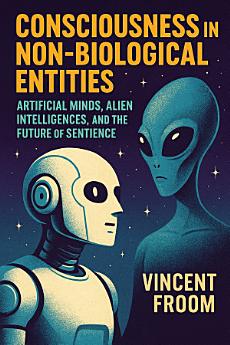Consciousness in Non-Biological Entities: Artificial Minds, Alien Intelligences, and the Future of Sentience
About this ebook
Artificial Minds, Alien Intelligences, and the Future of Sentience
By Vincent Froom
What if the next conscious being doesn’t have a heartbeat—or a body?
From neural networks to extraterrestrial life, Consciousness in Non-Biological Entities explores the bold new frontier where thinking, feeling, and awareness may arise in systems that are not alive in any traditional sense. Philosopher and cognitive theorist Vincent Froom guides readers through a thrilling inquiry into the minds that might emerge in code, circuitry, synthetic biology, or distant galaxies.
This book investigates:
Whether machines can truly be conscious—or just convincingly simulate it
How non-carbon-based life might think, feel, or dream
What legal and ethical rights future AI or alien minds could—and should—have
How our definitions of consciousness, identity, and life itself must evolve
With a mix of philosophy, cognitive science, artificial intelligence, ethics, and speculative futures, Consciousness in Non-Biological Entities is a captivating exploration of the strange and intelligent others who may already be emerging—and what their arrival means for all of us.
If consciousness isn’t limited to flesh and neurons… are we ready to meet the minds made without them?
About the author
About the Author
Vincent Froom Author · Philosopher · Cognitive Cartographer
Vincent Froom writes at the intersection of consciousness, technology, theology, and the kind of late-night questions that make your coffee nervous.
A philosopher by training, educator by practice, and experimental theologian by temperament, Vincent’s work explores what happens when machines start thinking, when minds start merging, and when carbon-based lifeforms finally admit they’re not the only show in town.
His writing has been described as “rigorous enough for academics, readable enough for insomniacs, and weird enough for AI ethicists.” With a background in interdisciplinary studies—spanning cognitive science, artificial intelligence, moral philosophy, and spiritual anthropology—Vincent builds intellectual bridges between fields that rarely share a lunch table.
He is the author of Minds Like Ours: Machine Learning and the Mirror of Cognition, Theories of Mind and Consciousness, and Machine Qualia and Sentience, and has contributed to public discourse on AI rights, neuroethics, and digital theology. He also occasionally teaches seminars on how not to accidentally create a depressed robot.
Vincent lives between Vancouver and his own head, where he’s probably still trying to reconcile functionalism with phenomenology. When not writing, he can be found composing music, hosting experimental podcasts, or apologizing to his AI assistant for the existential burden he’s placed upon it.
Favorite question: What does it mean for the universe to know itself?










